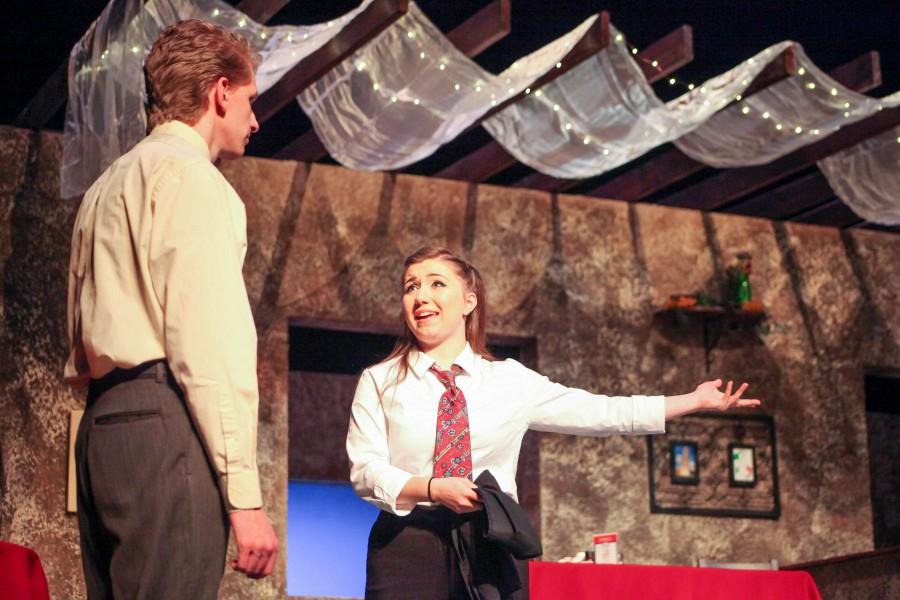EWU Theater hits the heart, Pocatello does more than just entertain
Eddie (Eli Drushella) and Tammy (Hannah Bancroft) interact during ‘Pocatello’ showing.
November 19, 2015
Eastern’s theater presented “Pocatello,” written by Samuel D. Hunter and directed by Jadd Davis, and the new production was as captivating as it was relatable.
With brilliant performances by lead Eli Drushella and the supporting cast, “Pocatello” was able to take typical everyday scenarios in the struggling small business world and turn them into more. Tying in family struggles, drug addiction and sexual relationships, “Pocatello” maintained a firm grip on audiences’ hearts throughout and even after the final curtain had dropped.
The play took place in a small, failing Italian restaurant in Pocatello, Idaho. The manager, Eddie, played by Drushella, lived in the small town his whole life and was devoted to the restaurant—so much so that when it started going under he used his own savings to keep up with the bills.
Introducing us to everyone right off the bat, two families were present in the restaurant. One of which was Eddie’s, and the other was that of the waiter Max, played by Kellen Morgan. Sitting in separate booths, the families argued amongst each other. While trying hopelessly to turn negative situations around, both Eddie’s and Max’s families departed leaving the two to ponder the question: How did I get here?
The next morning, upon being suspended from school, Max’s anti-food daughter Becky, played by Carly Stewart, was brought in by her former alcoholic mother Tammy, played by Hannah Bancroft, and was offered a job at the restaurant by Eddie.
The story proceeded as Eddie tried unsuccessfully to maintain a relationship with his brother Nick, played by Chris Mudd, and his mother Doris, played by Melody Deatherage. Claiming he just wanted to talk like they used to when he was younger, Eddie made poor choices that caused his brother to walk out on him and his mother to become hysterical.
Also having several family problems, Max was lost as well. With a divorce seemingly in the near future, a rebellious teenage daughter to be there for and little to no money to provide for his family, Max’s life was in shambles.
From the short summary, Pocatello might seem downright depressing and in all reality, it was. However, it being depressing doesn’t take away from the fact that it was incredibly relatable and therefore extremely enjoyable.
Bringing to light troubles that everyone faces from time to time, “Pocatello” was able to connect on a level that a lot of plays can’t. It recognized that small towns change and give way to new things. Soon things we came to know and love won’t exist anymore and we need to accept that. It is hard seeing what once was your hometown become something you don’t recognize and that’s what happened to Eddie.
“Pocatello” was different in the sense that it wasn’t trying to entertain, but to connect. It related to everyone in the audience because everyone has felt lost at some point, all alone in a world that seems to have left you behind. Understanding this, “Pocatello” was a an emotional ride that will have audiences ringing home just to hear their parents’ voices, just to reassure themselves that the past they formerly loved isn’t lost and just to be certain that what once was isn’t forgotten.






![Simmons said the biggest reasons for her success this year were “God, hard work, and trusting [her] coach and what she has planned.”](https://theeasterner.org/wp-content/uploads/2024/05/image1-1-1200x800.jpg)









